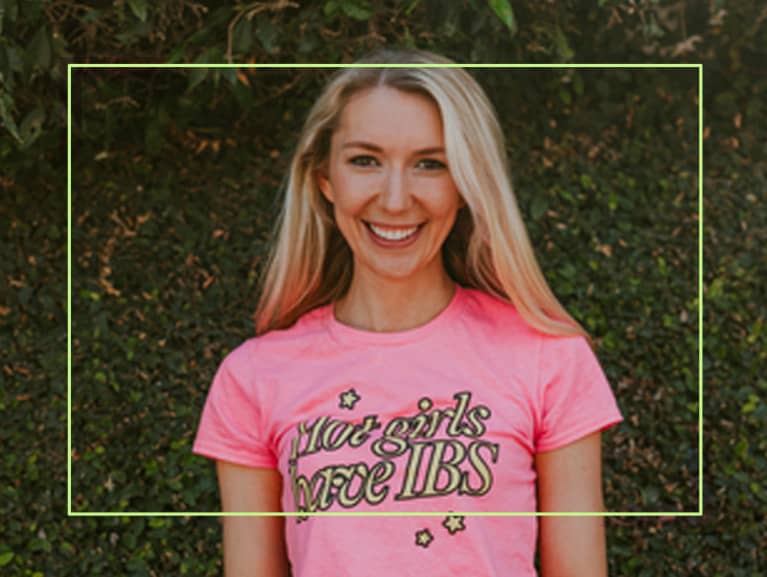|
Personal Story

While some health issues are visible to the outside world, many people face chronic conditions that don’t have externally visible signs or symptoms—also known as invisible illnesses. In mindbodygreen’s series, we’re giving individuals with invisible illnesses a platform to share their personal experiences. Our hope is their stories will shed light on these conditions and offer solidarity to others facing similar situations.
Six years ago I came down with debilitating gut issues. I got food poisoning during a trip to Mexico and then returned home, expecting everything to go back to normal. Before this, I had been fortunate to be one of those people who never thought twice about what I was eating—I wasn’t gluten-free, I wasn’t dairy-free, but I ate healthy. However, after the food poisoning, my symptoms never resolved themselves. Eventually, painful cramps and bloating led me to a gastroenterologist.
This was when I started on antibiotics. I was on one course, which became two, and then three courses—at that point I was still thinking there was a magic pill that could fix everything. Looking back, I desperately wish I could change that series of events, because I think the food poisoning may have resolved itself. But with everything that happened later, there was major damage to my gut.
I did all the things you’re supposed to do: colonoscopy, endoscopy, breath test, capsule test, supplements. I swallowed the pill with the camera, took probiotics and prebiotics. If there was a naturopathic diet, you name it, I tried it.
I started camping out in Facebook groups because there were so many groups dedicated to buzzwords that had become important in my life: SIBO, leaky gut, bloating, food intolerances, and IBS. But these words were missing from the grocery store shelf. It was as if this world that existed on the internet didn’t exist in the grocery store. What did exist was foods labeled “gut-friendly” or maybe occasionally “gut-healthy”, but you’d flip that box over and it would be full of ingredients that I knew messed with my body.
Mental health affects the gut, but the flip side is when you live with gut issues, half the battle is not pills and solutions. Half the battle is feeling heard, because it is a silent illness.
I started building my own Facebook community full of people just like me. At the time, I was matchmaking celebrities, and celebrities have entire teams dedicated to their health and wellness. Like anything that impacts your life, I started talking about my own issues with anyone who would listen. I was sitting across the table from celebrities, and I couldn’t believe how many of them could relate to living with daily digestive trouble. That didn’t necessarily mean their story matched exactly, but there was a common thread of poor gut health with no understanding of the underlying reason.
I formed a really close relationship with my GI doctor and was obsessed with asking him why gut issues had become so common. His answer, as well as many other GI doctors that I spoke to, was that it’s likely a combination of environment, food, and hormones. The problem is once you develop gut issues, it’s rare that you hear someone come out the other side with a diagnosis unless they have a very specific one like Celiac or Crohn’s.
Functional Nutrition Training
A cutting-edge nutrition deep dive taught by the world’s foremost health & wellness experts

In 2020, I’d just had a baby, and pregnancy adds a whole other layer to gut issues. It was then that I hit the point where all I wanted was a chocolate chip cookie. My husband decided to hire a food scientist and dietitian with the goal of making me the perfect, IBS-friendly chocolate chip cookie, because IBS was the diagnosis I was living with. Whether that’s right or not, I still don’t know.
He went to work in our kitchen—and he eventually cracked it. I realized I wanted to share it with the community I had built, and it turns out they loved them too. It quickly became clear that there was a market for the product, and it was something incredibly important to me. I was connecting with other communities and community members, and that was healing for me, too.
My experience led to a new beginning.
We hired a formulator to legitimize my husband’s recipe and a co-packing broker to find us the right manufacturer. I called the designers I’d been working with while matchmaking and asked him to design branding that would help make gut issues seem approachable and de-stigmatize the conversation. We raised capital and launched the business just over a year ago, and it’s been an epic ride.
When I launched the company, I wasn’t an expert—and I’m still not an expert. I’m just one of the crew, and that was the approach we took with the brand. We’re in this with you. We’re living it. We’re not afraid of the conversation.
Coping with gut health moving forward.
I eat a really healthy, minimal diet—I have 20 meals that I rotate. If I eat anything else, I’m worried it’s going to cause problems—beyond that, I do everything I can to take care of my body, including getting a lot of rest. As a result, I live somewhat symptom-free—but if I travel, for instance, I might have a snack that puts me in a bad place for the next six hours. It’s still something I navigate.
What I’ve learned is that gut issues and gut health are so closely tied to mental health for all sorts of reasons. Mental health affects the gut, but the flip side is when you live with gut issues, half the battle is not pills and solutions. Half the battle is feeling heard, because it is a silent illness.
When I first developed these gut issues, I grappled with it for a couple of years on my own. Looking back I was doing all the wrong things. I was taking antibiotics, trying a gluten-free diet for a full year, and realizing that none of it was working.
Food is the biggest trigger. I was never a big drinker so that wasn’t a big lifestyle change, but I haven’t had a sip of alcohol in almost three years. Stress doesn’t tend to be a trigger for me, but I know a lot of people feel stress is closely tied to their gut. Traveling is the hardest part when you’re living with gut issues. I pack a full carry-on when I go abroad with snacks and foods that I can eat.
I’m also adamant about what we feed our kids. I have two kids and I know enough about the gut microbiome to know that it’s important to start nurturing as early as possible. You’ve got to live life, but I’m more aware than the average person would be about what we give our kids to help develop a healthy gut microbiome from an early age.
What people should know about IBS & other gut health issues.
This is not just that my stomach hurts. It’s so much bigger than that. This issue consumes so much of someone’s mental energy all day, every day. It’s the feeling that you’re inconveniencing people. You get over that, but creating a safe space is important because you never know what someone is going through. That applies to all chronic and silent illnesses.
As we each have our own paths, we also know our bodies better than anyone else. That’s why it’s important to create an environment where everyone can do what’s best for their body at all times, in all scenarios. Because we all know how horrible it is to be in a situation where you’re not comfortable.
Interview by mindbodygreen’s health & fitness director, Kristine Thomason, as-told-to by mindbodygreen’s associate health & food editor, Merrell Readman.
https://www.mindbodygreen.com/articles/invisible-illness-ibs-symptoms-gut-health

